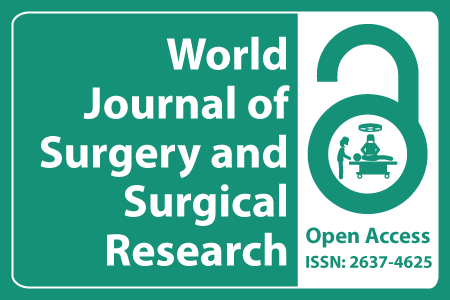
Journal Basic Info
- Impact Factor: 1.989**
- H-Index: 6
- ISSN: 2637-4625
- DOI: 10.25107/2637-4625
Major Scope
- Obstetrics & Gynecology
- Breast Surgery
- Podiatric Surgery
- General Surgery
- Otolaryngology & ENT Surgery
- Hand Surgery
- Aesthetic & Cosmetic Surgery
- Oral & Maxillofacial Surgery
Abstract
Citation: World J Surg Surg Res. 2022;5(1):1376.DOI: 10.25107/2637-4625.1376
Does Osteopathy Influence the Rate of Gastroesophageal Reflux Disease Following Sleeve Gastrectomy? A Randomized Controlled Trial (OsteoRGO Trial)
Mohamed Ali Chaouch1*, Aurore Chastin1,2, Clemence Morel1, Abdesalem Ghedira1, Catherine Legallo1, Zoé Roussineau2, Gianfranco Donatelli3, Olivier Soubrane1 and Guillaume Pourcher1,4
Department of Digestive, Oncologic and Metabolic Surgery, Obesity Center, Institute Mutualist of Montsouris, Paris, France Osteopathy School of Paris, Paris, France Interventional Endoscopy Unit, Private Hospital Des Peupliers - Ramsay Santé, Paris, France Paris-Saclay University, Paris, France
*Correspondance to: Mohamed Ali Chaouch
PDF Full Text Research Article | Open Access
Abstract:
Introduction: There is ongoing debate concerning post Sleeve Gastrectomy (SG) Gastroesophageal Reflux Disease (GERD) de novo. We assessed the effects of osteopathy after SG on quality of life and postoperative GERD occurring. Methods: This is a prospective randomized controlled trial. We included adult's patients who had undergone a SG. The patients were randomly allocated to the osteopathic group (group A) or control group (group B). The primary outcome was to evaluate the efficacy of osteopathy to reduce GERD de novo and lessen the quality of life after SG using the REFLUX-QUAL Simplified® questionnaire (RQS) at the first postoperative day, two and four's postoperative months. An X-barium meal was systematically performed three months after SG as an objective method to confirm a postoperative GERD. Results: We randomly assigned 50 patients to the two groups. Two months after sleeve gastrectomy, there was a similar RQS score between groups A and B (79.4 vs. 72.9, p=0.17). At four months, we found a significantly greater RQS score in group A (90.4 vs. 75, p<0.05). As concerns the X-barium meal, it was performed in 40 patients (80% of patients). GERD was reported in three patients in group A and seven patients in group B (14.2% vs. 36.8%, p<0.01). Conclusion: For patients undergoing SG, postoperative osteopathic care could reduce GERD de novo after SG with a greater quality of life.
Keywords:
Gastroesophageal reflux; GERD; Sleeve gastrectomy; Bariatric surgery; Osteopathy medicine
Cite the Article:
Chaouch MA, Chastin A, Morel C, Ghedira A, Legallo C, Roussineau Z, et al. Does Osteopathy Influence the Rate of Gastroesophageal Reflux Disease Following Sleeve Gastrectomy? A Randomized Controlled Trial (OsteoRGO Trial). World J Surg Surgical Res. 2022; 5: 1376..













